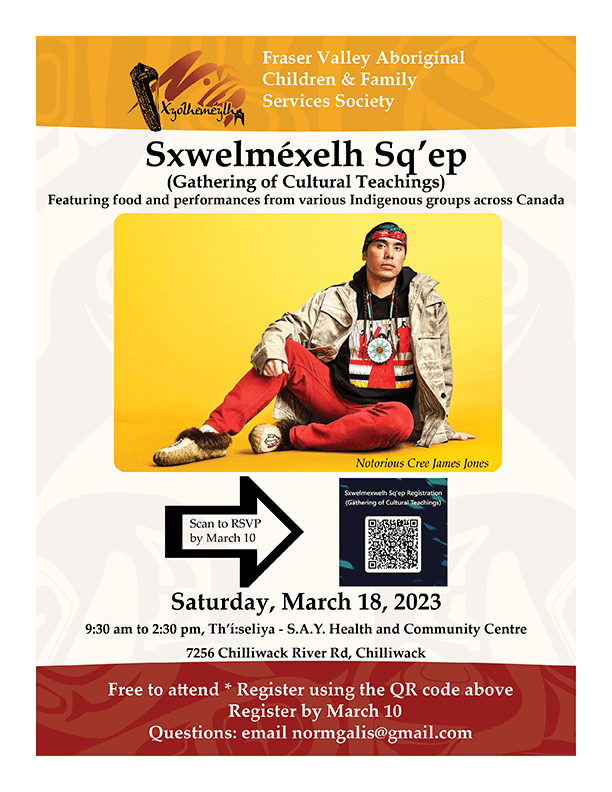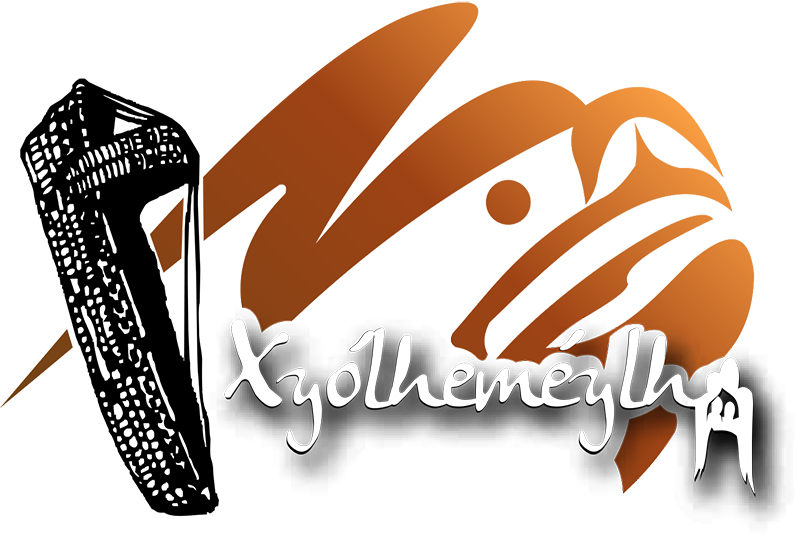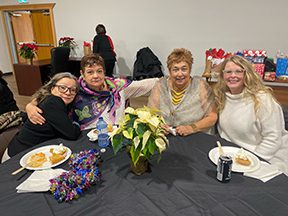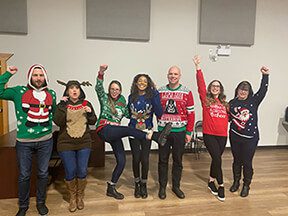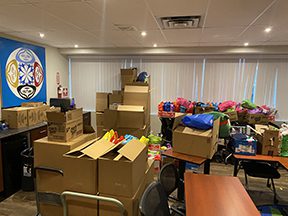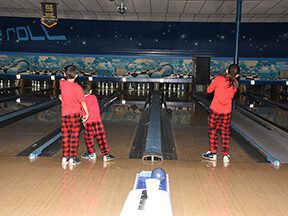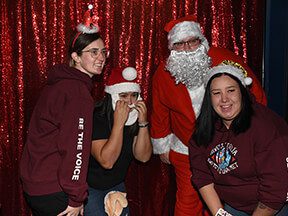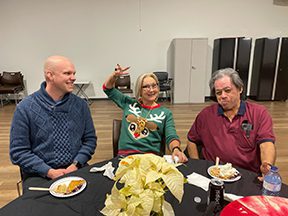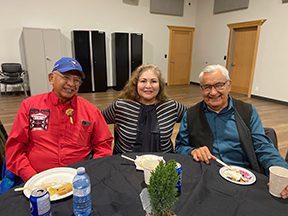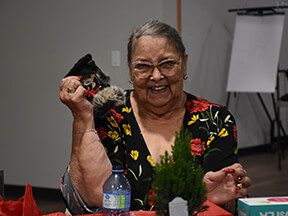Message from the board of directors
Fraser Valley Aboriginal Children & Family Services Society
Sqwélqwel - Xyólheméylh Winter 2023 Newsletter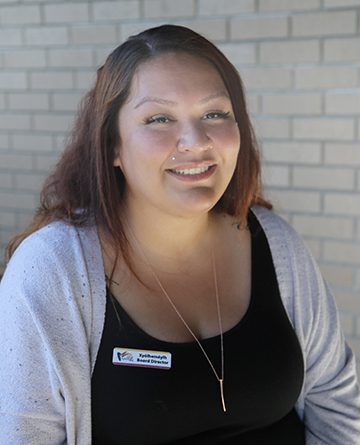
Board President Jennifer Janik.
Ey Swayel – Good Day,
Happy New Year and welcome to our winter newsletter. This past November we held our Annual General Meeting and had an election for five board seats. On December 13th, 2022, our Board held our executive election, and the results are listed below.
Jennifer Janik – President; Jade Victor – Vice President; Jolene Irons-McDivitt – Secretary; Glenda Campbell – Treasurer; Tammy Bartz; Paula Olmstead; Joshua Bailey (new); Angelina Bowen (new); Phil Hall (new).
I want to raise my hands to Dr. Wenona Hall, Marion Mussell and Peter John for their hard work and commitment to Xyólheméylh over the years. They are all a wealth of knowledge and it was an honour to work with them over the last few years. I also want to thank all the society members who came out and voted at the AGM.
January 4th marked the first National Ribbon Skirt Day in Canada. In December 2020, 10-year-old Isabella Kulak from the Cote First Nation in Saskatchewan wore a traditional ribbon skirt to her school’s formal event. Isabella was told by a teacher that her skirt was inappropriate, and she was encouraged to change her clothes. Her story spread online and in the media, so much so, the government declared it a national awareness day, and a day to recognize, learn about celebrate the importance of Indigenous traditions and expressions of culture.
We have an article in this newsletter about ribbon skirts – in Ask an Elder, Julie George explains the importance of ribbon skirts and we have a new workshop we’re offering for youth, ages 16 to 19 that we will write about in a later issue. The program is facilitated by local Elders who will share teachings about ribbon skirts and show Indigenous youth how to make their own skirt. Xyólheméylh has purchased sewing machines, fabric and ribbons through prevention funding from the federal government for the initiative. We’re very excited about the new program and anticipate it will be very popular.
I am very honoured and humbled to be elected as the Board of Directors President. I look forward to the good work. Kw’as Hoy - Thank you to the Xyólheméylh staff, Elders and caregivers, as well as our community partners.
Melath’í:yatel - Jennifer Janik
President, Xyólheméylh Board of Directors
Message from Executive Leadership Team
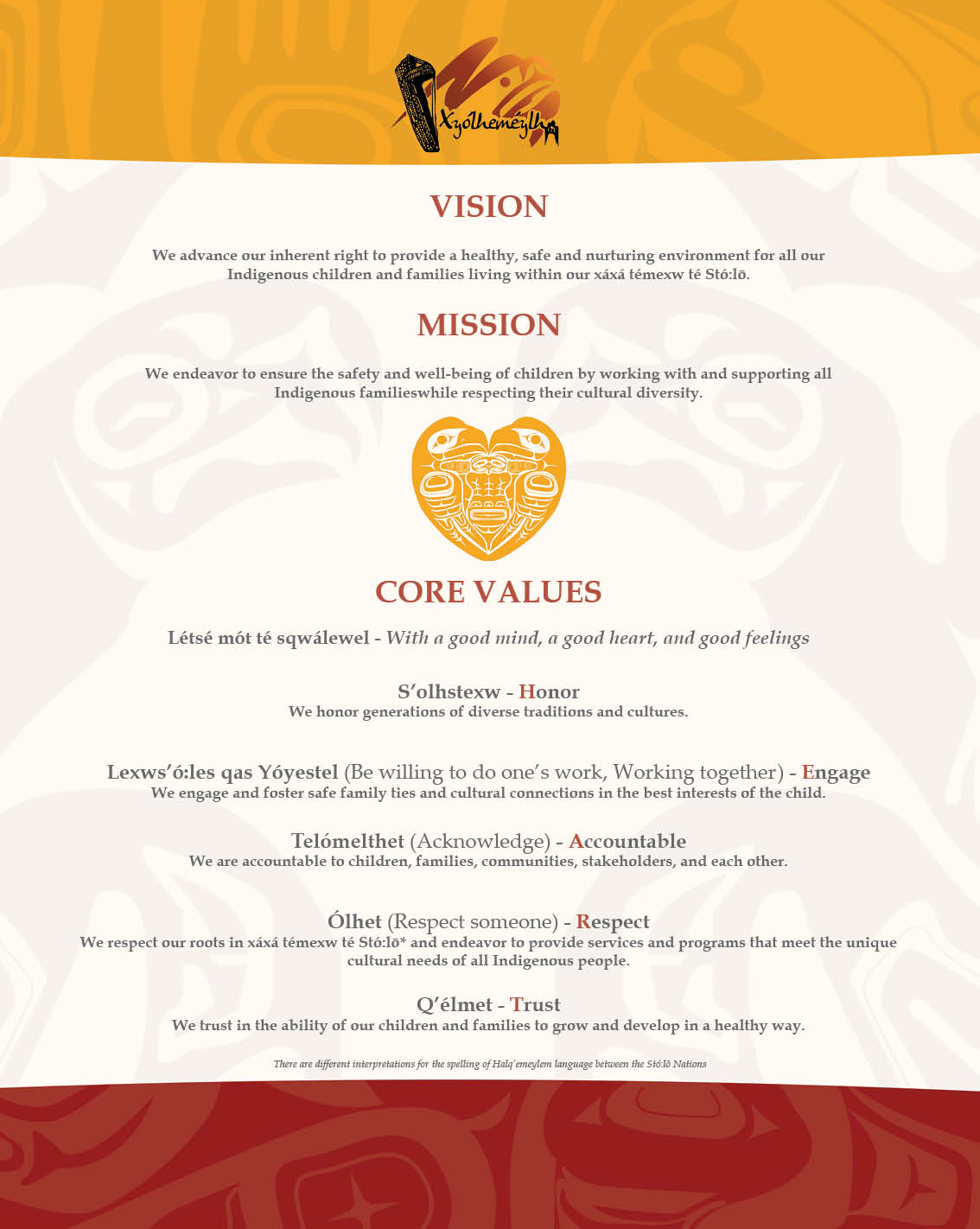
Our Vision, Mission and Core Values
As an organization with approximately 300 staff what we know is the importance of upholding our vision, mission and heart values in all we do.
Could you imagine what the world would be like if we all lived and worked in this way? It is something that we hold near and dear to our hearts. Our leadership team met for a strategic planning session and this was a long conversation with a lot of discussion of how we walk in the world in a good way to do the very best for those we serve and for each other as a work family. We would like to thank Dr. Wenona Hall, Marion Mussell and Peter John for the work they did during their time on the board and welcome the new board members to our work family.
We had a year of growth in 2022 and honored where we have been as an organization and we're looking forward to celebrating new beginnings in the year ahead. In the spring newsletter we will share more of what we have as we continue to spring forward in this calendar year.
Community Partner: Meet Kelowa edel, Health Director, Stó:lō Services Agency
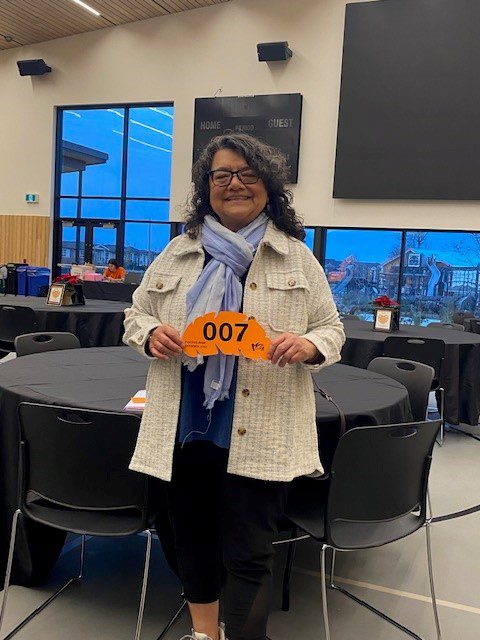
When Kelowa was a child, growing up in Anishinaabe territory in Manitoba, she remembers her older family members telling her all about their problems. “From a very young age I learned how to be a good listener and reassure people,” says Kelowa. “When I came to BC, it was the same, people would tell me their problems, they wanted to be heard. That was my calling, to be a social worker.”
Interestingly, Kelowa is from the Sagkeeng First Nation, which means “mouth of the river” and for the last 30 years she has been working in Stó:lō territory, supporting “the people of the river.”
“I really like the way I was taught, by several of our elders when I came here, is that you do your work in a good way, and what that means ultimately is that you’re coming from a place of humility and love. You are culturally safe, you have a deep and unjudgmental understanding of the history that has plagued the colonized and you have an appreciation for that history and the challenges that people need to overcome, the trauma, the addictions, all of those things. You can make them feel safe. At least they have a safe place to start a healing journey,” says Kelowa.
Kelowa started with Xyólheméylh back when it first began as a family support worker in 1993. After 17 years she moved over to the Stó:lō Services Agency as a community hub coordinator, before becoming the Health Director ten years ago. As part of the vision as a team, we wanted to eliminate issues when people seek support, as there are times when people are told that they can’t be served, or they don’t provide that particular service. Through our partnership with Chilliwack Healthier Communities, we developed the concept of “every door is the right door.”
“If we can’t help people because we don’t have the mandate or the funding, we have a service navigator that has relationships with all providers in Chilliwack. She can directly support and connect them to the right resource. That’s something we pride ourselves on,” says Kelowa.
Kelowa is now supported by Lauralee Campbell and Sue Griffin as Associate Directors who take care of the day to day operations, freeing Kelowa to do the higher level work such as relationship building, connecting with funders and partners, and working with the Chiefs. “The big piece is nurturing those relationships.”
One of Kelowa’s priorities for the agency is “to level the playing field.” That means more funding for services that are in demand, such as alcohol and drug addiction and mental health. She believes that MCFD needs to open up RFPs for Indigenous-led services and that there is still institutionalized racism in the system. “How many Indigenous people are going to go to a non-Indigenous provider? There are some, but the reality is they’re not going to feel safe. People feel safe coming here but we don’t have the adequate dollars to do the work. So, I’ve recently spoken with one of our chiefs about this and she said I need to push this further, it needs to be driven at a political level. It’s about leveling the playing field,” says Kelowa.
Another priority for Kelowa is youth and supporting youth in personal development. This includes teaching life skills, learning how to communicate, learning that you need to work for your money, setting personal boundaries, and taking responsibility.
One of the programs that Kelowa is most proud of is the Mémiyelhtel program which provides holistic, long-term and intensive support to vulnerable youth between the ages of 12 to 19. The ultimate goal is to support youth to have a strong sense of identity, self-love and acceptance. Youth are assigned an Intensive Support and Resource Worker (ISRW) to assist with case management, navigating resources, and advocating. The role of the ISRW is to be the #1 Fan of the youth they are assigned, according to their website. The youth are followed until they graduate. Their workers do everything from getting them to school, knocking on windows, getting the kids out of bed, going for walks, and talking about family life. There are currently 30 kids in the program with a waitlist of more than 50. They are currently finalizing a proposal to help support this program and the indigenous community youth at large, with land-based healing modules where the kids will experience being on their land.
Kelowa believes that healing is the number one priority. She says it should be community based and involve collaborating with partners. That includes partners like Xyólheméylh, MCFD, and the Justice system. In Kelowa’s perfect world there would be more collaboration and programming based on feedback from the community. She is also a big believer in the ability of the land, and our connection to it, to heal people.
“One of things very near and dear to me is land-based healing. As a youth, I grew up off reserve, where there was a lot of racism and prejudice, but a week every year we would go and traditionally harvest wild rice in the Whiteshell Provincial Park. We would live out there for a week and live off the land, hear the stories and the language, which helped me understand my value as an Anishinaabe woman and learn from my Elders. My uncle taught me many values and teaching out there but one sticks out for me the most, the importance of courage, paddling across a lake in a storm, focusing on the shore, and trusting that you’re going to get there. For me that’s what we need to support our youth and their families in their healing process, the connection to land,” says Kelowa.
caregiver support networks program
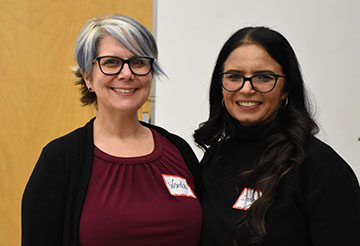
Photo: L-R: Wanda Smith and Inderjit Aujla
Caregiver Support Parents can often feel isolated and not part of a larger support network. Xyólheméylh and MCFD wanted to fix that by organizing a Caregiver Support Network in collaboration, where caregivers could meet each other, discuss their challenges and issues, receive guidance from the Elders and bring their concerns to staff.
Xyólheméylh and MCFD organized the first ever Caregiver Network meeting on January 12 at the Neighbourhood Learning Centre in Chilliwack. A small group of caregivers were invited to kick off the event with Xyólheméylh’s Elders, staff from MCFD and the agency in attendance. The event was hosted by Inderjit Aujla, Xyólheméylh’s Director of Operations, Resources, and Wanda Smith, Director of Operations for MCFD. Inderjit and Wanda had been talking about the need for a network to bring together caregiver from both agencies together as a community caring for our children for a long time, so the event was very special for them. Wanda has had this program for the MCFD caregivers in the Chilliwack community in place since 2013.
After lunch, everyone introduced themselves. Elder Rosemary Trehearn talked about her experience of fostering children and in particular kids who were difficult. She said “Those kids would tell me they wanted someone to listen to them . . . I know in fostering there’s tears too, we have the sadness but we also have the good, and that’s what we have to hang on to.”
Elder Maria Reed called the caregivers, “angels on earth,” and said: “It is time for us to come together as a village to work together.”
The Caregivers introduced themselves and talked about their experiences, including their experience with extended families and giving the kids a sense of identity.
The program is led by network leads, experienced caregivers, who share their knowledge and wisdom with other caregivers while working closely with the Resource programs. The caregivers who were contacted to attend the Meet’ N Greet, will hear from their network leads for the upcoming events.
The next steps are to expand the program to all of Xyólheméylh caregivers in the East region. This would require hiring three to four network leads from Xyólheméylh. We are looking at exploring bigger space options to accommodate the growing program needs so that all of our caregivers can benefit from the support and connecting with each other. It is a program in collaboration and partnership for the caregivers, run by the caregivers, one community, caring for our children. It will provide an opportunity for caregivers to learn and engage in Indigenous ways of being while caring for Indigenous children and youth in their homes.
Meet Caregivers: terrie-jo shouting
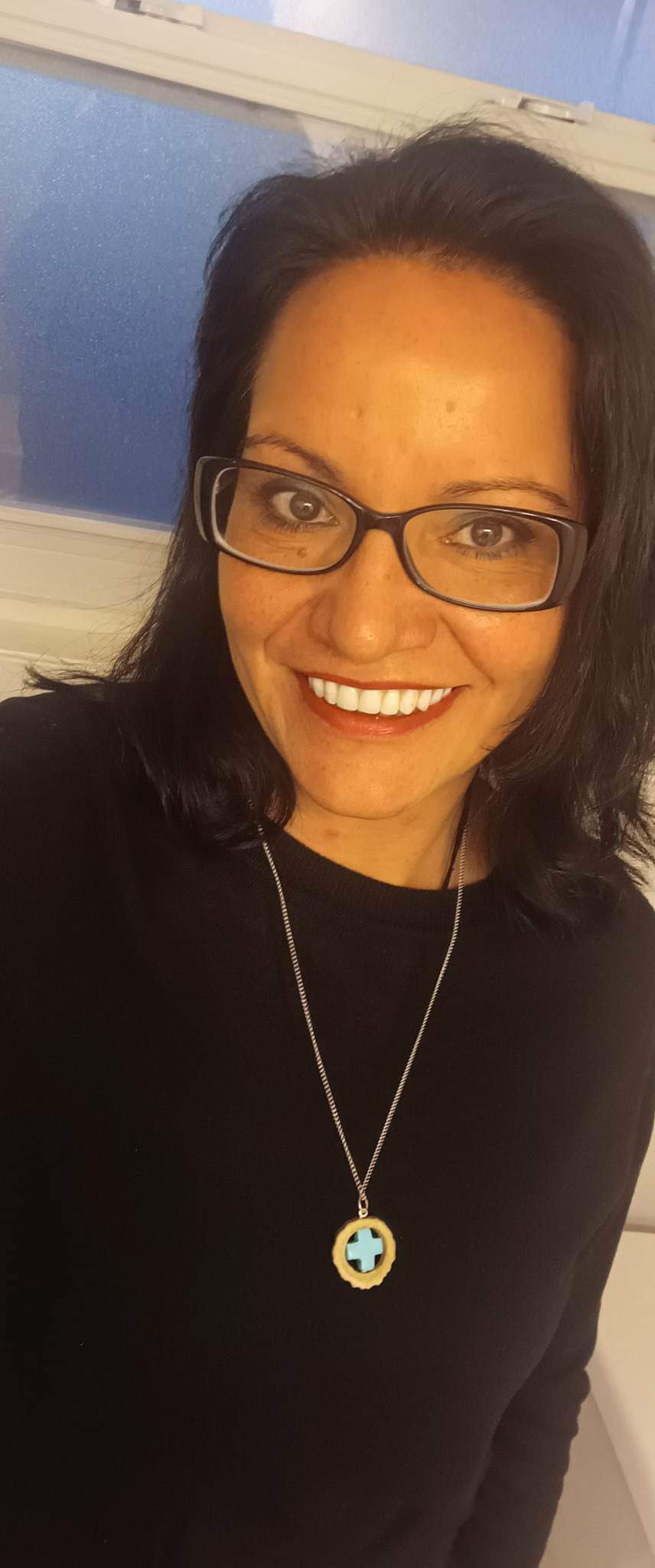
Terrie-Jo Shouting believes she was always meant to care for children. She currently has five children at home with her – two biological girls, ages 16 and 12 and three foster children - two boys, 15 and 12 and one girl, age 10. The three foster children are her nephews and niece.
“I feel I’m supposed to do this,” says Terrie-Jo. Years ago she was given a child to care for, she went back to her mom after a year, and a nephew lived with her for five years. “I’ve always had kids in my house, they gravitate towards me. My house is just meant to have kids,” says Terrie-Jo.
She says the family has a good dynamic. “We are a We Family, I call it We-ism, there are no I’s,” says Terrie-Jo. “We all have our different quirks, but we all get along, everyone has a voice. We all work together, we are a team.”
Terrie-Jo is from the Blackfoot First Nation in southern Alberta, however she was raised by her German/Russian mother and did not have much exposure to her culture as a child. It was as an adult that she started to learn and begin a voyage of self-discovery. Her father was an important spiritual healer on the Blackfoot reserve and was the catalyst. “He gave me my first teaching right before he passed,” says Terrie-Jo. She plans to go back this summer to be with family and for the Sundance on the reserve.
She feels strongly that children need to know their culture to know their identity. “From my experience, it’s the kids who grow up not knowing their culture, are the ones who unfortunately start going down the black road. It’s important for the wholeness of your spirit,” says Terrie-Jo.
Terrie-Jo is currently going to school full-time to get her credentials as a Mental Health and Addictions Support Worker. She has a strong urge to help people. For a time she would average 26,000 to 30,000 steps a day handing out bundles of food to help people living on the street in Abbotsford.
“I’d like to be able to help other Indigenous parents to be able to get through their circumstances, so they can better themselves and be productive parents. Sometimes life’s circumstances can get us down, we can get in a hole. I’d like to help people undig themselves from the hole. I feel I am meant to uplift people, even if it's just listening, reminding them that they matter,” says Terrie-Jo.
Terrie-Jo is currently facilitating a virtual circle with Elder Maria Reed for Xyólheméylh caregiver/support parents which runs until March. “I reached out to Maria because I wanted to learn more Indigenous teachings. I asked her to smudge my house and she did. We talked about starting something so I could learn and other caregivers could learn about the different teachings,” says Terrie-Jo. The goal of the Virtual Circle is to create a community while supporting children in care to grow with cultural and spiritual balance.
Terrie-Jo and other caregivers make a huge difference, offering safe and loving homes. We lift our hands to Terrie-Jo and all the Xyólheméylh caregivers. If you are interested in becoming a caregiver we have info sessions the 2nd Wednesday of the month at 6:30 pm and the 3rd Tuesday of the month at noon. Contact Norma Commodore at [email protected] to register.
New feature: Si:yólexwe teachings
Meet an elder: darlene tommy
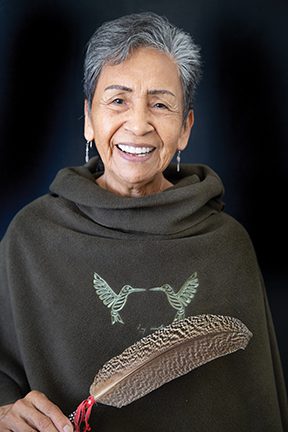
Darlene Tommy believes that love saved her from being broken by the residential school system. Specifically the love of her mother. “I was fortunate to have a mom who loved me,” says Darlene. “I would like all our children to have the same love that my mom gave me.”
Darlene is a member of the Skwah First Nation, but grew up at Matsqui with her mother until she was seven years old, when she was then taken to St. Mary’s Residential School in Mission. She spent the next nine and half years at the school. Despite the cruel conditions at residential school, Darlene was a natural student and excelled academically, but was unable to continue to post-secondary because of the inferior nature of the education there. In fact, she intends to go back to university and get a degree in psychology.
I feel like the residential school robbed me of continuing my education. I’ll be 80 by the time I get a degree,” says Darlene. “I would like to help children because our children have had quite challenging lives from probably day one.”
After graduating high school, Darlene went to California as she had an aunt who lived there. Darlene lived there for 40 years. Darlene has one child who lives in California with two grandchildren. Because of COVID she hasn’t seen them in four years, but hopes to go soon.
Because she lived in California for so long, and residential school before that, Darlene was not immersed in the Stó:lō culture. She says she didn’t want to be because residential school had made her ashamed of her culture and heritage. “I just wanted to get away from all of it, that’s why I left, I wanted to be a different person,” she says. “Wherever I went, people thought I was from there. I passed as Mexican, Hawaiian, Italian, and I never said I was First Nations because I didn’t want to be,” says Darlene.
Later in life she had a neighbour who suggested she read a book about the Trail of Tears, about the Cherokee First Nation being forced off their ancestral lands in the 1830s. “I read it and I couldn’t believe how our people were treated. It helped me to turn around and be proud of who I am in spite of everything that had happened in my life,” says Darlene.
Darlene returned to Stó:lō territory and worked as administrative support for the Stó:lō First Nations Chiefs, retiring eventually in 2014. “I learned a lot about my culture after being away for so long,” says Darlene. Her lifelong love of learning also kicked in when she retired. Since then, she’s been taking classes and reading books about mental health. “I wanted to understand why people would go into a situation like residential schools and be so cruel to children. To me it was like they must have mental problems … it helped me to understand people, and my own people.”
“I’m on this path …. I have this urge inside me that I should help, that’s why I signed up to be an elder with Xyólheméylh,” says Darlene.
Medicine Teachings with the Elders: Sweetgrass
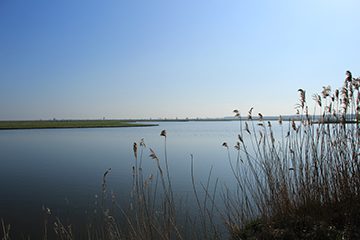
ask an elder: Ribbon skirts with julie george
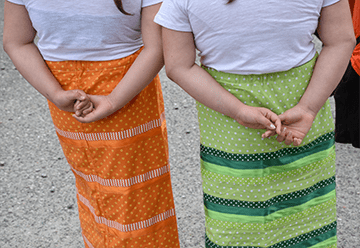
Reflecting on the first National Ribbon Skirt Day that happened earlier this month on January 4, we thought it might be timely to ask an Elder about the significance of ribbon skirts. We asked Elder Julie George who makes ribbon skirts to share her knowledge.
First, a little about how the national day came to be. In 2020, ten-year-old Isabella Kulak, an Indigenous student from the Cote First Nation in Saskatchewan wore a ribbon skirt to her school’s formal event. She was told by a teaching assistant that she was dressed inappropriately and that she should change. Her story spread online and became widely publicized. On her first day back to school after the holidays, a crowd of women wearing ribbon skirts led her to school.
The ribbon skirt is a traditional piece of clothing worn by women and girls across many First Nations and Metis. They are traditionally worn during ceremonies and at special events. But they are so much more than that.
They represent the person’s identity, as well as their strength and resiliency. Julie says the process of making the skirt is as important as the end result. “It is a process of healing yourself. It’s intuitive and creative, but also gives you strength,” says Julie.
Julie says the colours chosen are the colours that give you strength. “For example, red is associated with fire, energy, bloodline and love,” says Julie. Red is also the colour associated with the Missing and Murdered Indigenous Women and Girls movement. Yellow is the colour of surviving suicide of someone close to you.
Young girls are often given the materials and ribbon to make a skirt. “When you give a gift to someone you should give it with your left hand,” says Julie. “That is because the left hand is closest to the heart, and you are giving the gift from your heart.” The skirts are also associated with sage, the medicine of healing energy.
When asked if it is appropriate for non-Indigenous people to wear ribbon skirts, Julie says that she doesn’t see a problem with that.
Xyólheméylh has purchased sewing machines, fabric and ribbons and has started offering workshops with local Elders who will share teachings about ribbon skirts and show Indigenous youth how to make their own skirt. We are very excited about the new program and anticipate offering the workshops on a regular basis.
Meet a FVACFSS Board Member: Joshua Bailey
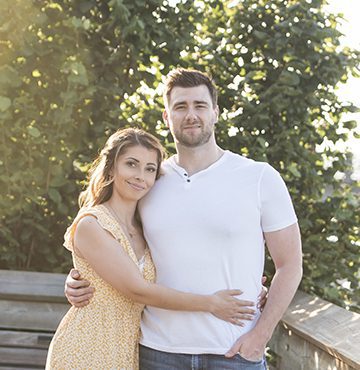
Joshua Bailey is one of the newest members of Xyólheméylh’s Board of Directors, elected at the AGM this past November. Joshua is Kanien⁷kehá:ka (Mohawk) From Ohswé:ken, Ontario and is a former frontline worker and Team leader with Xyólheméylh. He currently operates a consulting firm called A:kweks Ventures that specializes in Indigenous child and family welfare prevention programs and community development. He has a BA in Anthropology and Psychology and an MBA. He has two boys aged 10 and 11 and lives in Chilliwack with his wife Tiffany, who was also a Xyólheméylh social worker. He likes being physically active, archery target practice and bowhunting as well as playing Dungeons and Dragons.
Joshua wanted to be on the board because he wanted to give back to the agency and believes that his experience as a front-line worker gives him a unique perspective. “I have experienced firsthand what it takes to do the work, I understand the barriers and challenges and the stresses that the agency goes through. Being able to bring that to the board to help support them making changes, to support the Board in helping them understand the work,” says Joshua.
Joshua believes that the priorities for the board should include working on Xyólheméylh’s community reputation; developing partnerships among service providers to increase the services for Indigenous families; supporting ELT as they continue to develop best practices and services; and helping to rebuild connections with communities. “Child protection comes with a lot of stigma attached, so being able to break down the fears of working with Xyólheméylh and seeing us as a support rather than an adversary,’ says Joshua. Joshua believes that the agency needs to build practices and policies from a foundation of culture. “Culture is connected to self-esteem and identity,” says Joshua. “When a child is removed from family and displaced within a stranger care placement, they are severed from that connection and identity and sense of belonging. Being able to support them in holding on to that culture helps create solid foundations, the connection to where they come from. There’s a huge resilience factor in that for the success of the kids we work with and those who end up aging out of care."
“I remember giving a presentation on the difficulties of connecting the kids we worked with to their culture, and an Elder called me out, and said there are a number of kids in care that will have no ability to connect with their culture on their own. She told me ‘It’s your job as a social worker, to provide those opportunities to those kids.’ I have carried that with me as a social worker, in the work I do now, and now in my role with the board. It is our obligation to provide those opportunities and to help build connections to communities and supporting the wellbeing the children we work with.”
Joshua says it’s important for social workers to take care of themselves to be able to do the work. “Being able to take care of yourself and make sure you’re coming in to work for those kids to the best of your abilities, that takes personal wellness. It takes a whole team coming together to ensure we are going beyond the due diligence, we’re going beyond the bare minimum to connect these kids with family and culture, to reunify these kids with their families”. Joshua also wants social workers to know “that you may not be the person who solves the problem or resolves the issues, but you are a beacon of hope along the journey to get the person there.”
meet Xyólheméylh’s Human Resources, Training and Health and Safety team
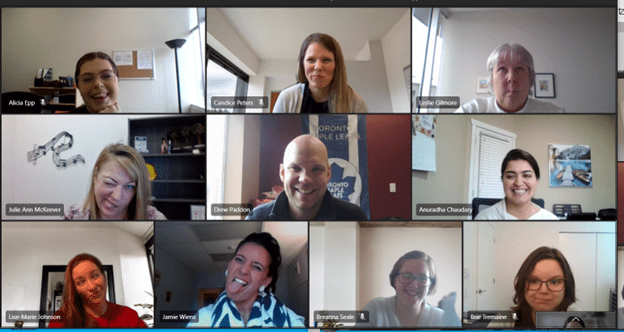
Pictured above (Alicia Epp, Candace Peters, Leslie Gilmore, Julie Ann McKeever, Drew Paddon, Anuradha Chaudary, Lise-Marie Johnson, Jamie Wiens, Breanna Seale, Brie Tremaine)
The Human Resources, Training and Health & Safety Team has grown over the last year from five to ten members, reflecting Xyólheméylh’s priorities to improve recruitment, retention, training, health and safety of staff.
The team is led by Director of Operations, Human Resources, Training and Health and Safety, Drew Paddon, who joined Xyólheméylh about eight months ago. He provides high level strategic direction to the team. Drew says he believes the primary function of the team is to take care of the employees so they can go out and take care of all the clients, communities and families. “We’re like the social workers for the social workers, whether you have an unsafe environment or you’re not sure how to access various services, we have a team full of experts who know how to support you so you can turn your time, attention and energy to doing the amazing front-line work that you’re here to do,” says Drew.
Human Resources is led by HR Manager Anuradha Chaudary. Her team includes Lise-Marie Johnson, who is in charge or recruitment of staff; Candice Peters and Breanna Seale are the HR Advisors, who together provide support to specific portfolios with performance management, life events & benefit management, coaching and guiding management and employees on labor relations issues, conflict resolution and interpreting collective agreement and HR policies; and Leslie Gilmore, who provides administrative support to the team, creating ADP profiles, managing Synerion profiles, scheduling interviews and generally making sure the shop is running smoothly. The team will be busy this year with the collective agreement ratification and negotiations with the union, as well as succession planning to ensure internal staff are prepared for various levels of positions throughout the organization.
One of the overarching priorities for the team is Indigenizing HR, which is going to be a complex and multi-year endeavor. “This means taking colonial processes inherited from MCFD and the corporate world and trying to find better ways of doing things inspired by our Indigenous roots,” says Drew. This will include revamping HR policies, examining the language we use and hiring practices, and bringing in more culturally appropriate policies. They are reaching out to external organizations that are undergoing the same process, as well as working with Elders.
The Training Department is led by Jamie Wiens, who is in charge of planning, development and implementation of Xyólheméylh’s training needs. She is supported by Brie Tremaine who is the Training Development Coordinator and Alicia Epp, Training Support Representative. They have implemented a bi-weekly on boarding training process for new staff and they are looking at a bi-annual training session all staff training where they would learn about the history and purpose of the agency. They’ve also implemented a database to track everyone’s training, as well as a training portal where people can see what’s coming up and register for training. One of their priorities is developing a structured training and mentoring program for social work staff, developing in house training for family strengthening staff, supervisors and administrative staff
Julie-Ann McKeever is the Health and Safety Administrator who, together with Drew, ensures that we are following WorkBC guidelines, that offices have the required supplies, and that incident investigations are completed. One of their priorities is revising health and safety policies to make sure they’re up to date, expand their roster of first aiders, and continue to grow a safety-first culture.
The whole team is invigorated and enthusiastic about the way things are moving under Drew’s leadership. Lise-Marie says she feels very supported and loves that HR is getting more involved with staff. “I feel like people don’t know who we are and what we do, so I’ve been attending basket meetings, just being more out there and present,” says Lise-Marie. Alicia, who is the newest member of the team comments that everyone has been so kind and welcoming to her. Jamie says she feels supported in her professional development.
The team is offering a challenge to Xyólheméylh staff to share more HEART cards on the Intranet (these are cards that staff can send to each other, expressing their appreciation). Send one HEART card to somebody who’s done something nice for you. Instructions are here: https://www.intranet.fvacfss.ca/wp-content/uploads/2022/09/H.E.A.R.T.-Card-How-to-August-2022.pdf
- Fun Facts about the Team:
• Breanna is the youngest of 13 children
• Anuradha enjoys doing adventurous things from time to time, like paragliding, jumping out of an airplane
• Lise Marie is the mother of four children, grandmother to two, is adventurous and outdoorsy and can do a back flip on a trampoline
• Leslie has discovered several family connections within the Xyólheméylh family that she didn’t know she had. She discovered it while applying for her Status.
• Drew is going to spend 10 days as stage crew for a musical theatre production. His kids are at the Chilliwack School for Performing Arts.
• Candice has traveled to 15 countries and taught in Korea for a year
• Brie makes her own Kambucha
• Jamie is 5’1” and her husband is 6’10”
• Alicia got her first pet last year and has enormous feet. She is size 11 1/2 feet in women’s shoes
• Julie-Ann’s blood type is O rh neg .... which means she can give blood to anyone, and it is used most often during emergencies. 15 per cent of the world's population only has O Rh neg blood type.
Recipe: paula olmstead's deer stew recipe

It's the time of year for comfort food! Here's Board member, Paula Olmstead's Deer Stew recipe:
- 1 lbs of deer stew
- 1 small Onion
- 2 or 3 stalks Celery
- 2 or 3 med Carrots
- ½ or so rutabaga or turnip
- 1 cup frozen corn and peas
- Garlic
- Salt and pepper to taste
- Rosemary dried ½ tbsp
- Deer broth (homemade from bones)or a container of beef stock
Preheat oven to 375 degrees
In a Dutch oven I brown the deer meat, onions garlic and celery in oil.
I slice the celery, carrots, onion into bite size pieces.
I cube the rutabaga into about ½ inch cubes
Add vegetables to Dutch oven stir together
I put lid on Dutch oven and cook in preheated oven for 45 minutes or until meat and vegetables are tender.
I then will take out of oven and cook on stove top adding the broth bring to boil.
I will then make a paste of flour 1 cup and 1 ½ cups Luke warm water to slowly pour into Dutch oven.i use a strainer to prevent lumps. Make sure to stir to prevent sticking and clumping sometimes you might need an extra set of hands.
Cook on med low till thickened the more the paste the thicker the stew. I cook for about five minutes to make sure the flour is cooked in… enjoy I will serve with mashed potatoes/rice or just bannock.
Enjoy!
chilliwack chamber of commerce
business excellence awards
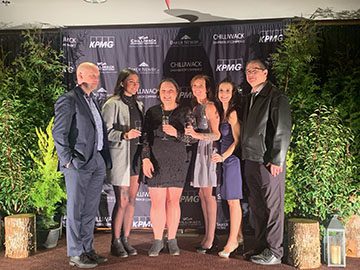
Pictured above: Drew Paddon (Director of Operations, HR, Training and Health and Safety); Jade Victor (VP Board of Directors); Jennifer Janik (President, Board of Directors); Kyla Darby (Executive Director, Programs; Penny Trites (Executive Director, Staff and Community Relations); Rod Spitzig (Executive Director, Administrative Services).
We were honoured to have been nominated for a Chilliwack Chamber of Commerce Business Excellence Award in the not-for-profit category and had a great time at the awards ceremony January 28. Congratulations to the Ann Davis Society who won the award!
Christmas at XyólhemÉylh
The holiday season is always a busy time at Xyólhemeylh and 2022 was no different. We helped spread some holiday cheer by providing Christmas hampers to over 100 families in the Fraser Valley, as well as 150 youth. Thank you to everyone who donated. It really made a difference to so many people this holiday season.
We organized two children's Christmas parties in December - one in Abbotsford and one in Chilliwack. The events were held at bowling allies with food, prizes and an appearance by Santa Claus. Over 100 families attended.
We also organized a special luncheon for our Elders. We hope everyone had a wonderful and restful holiday!
upcoming events:
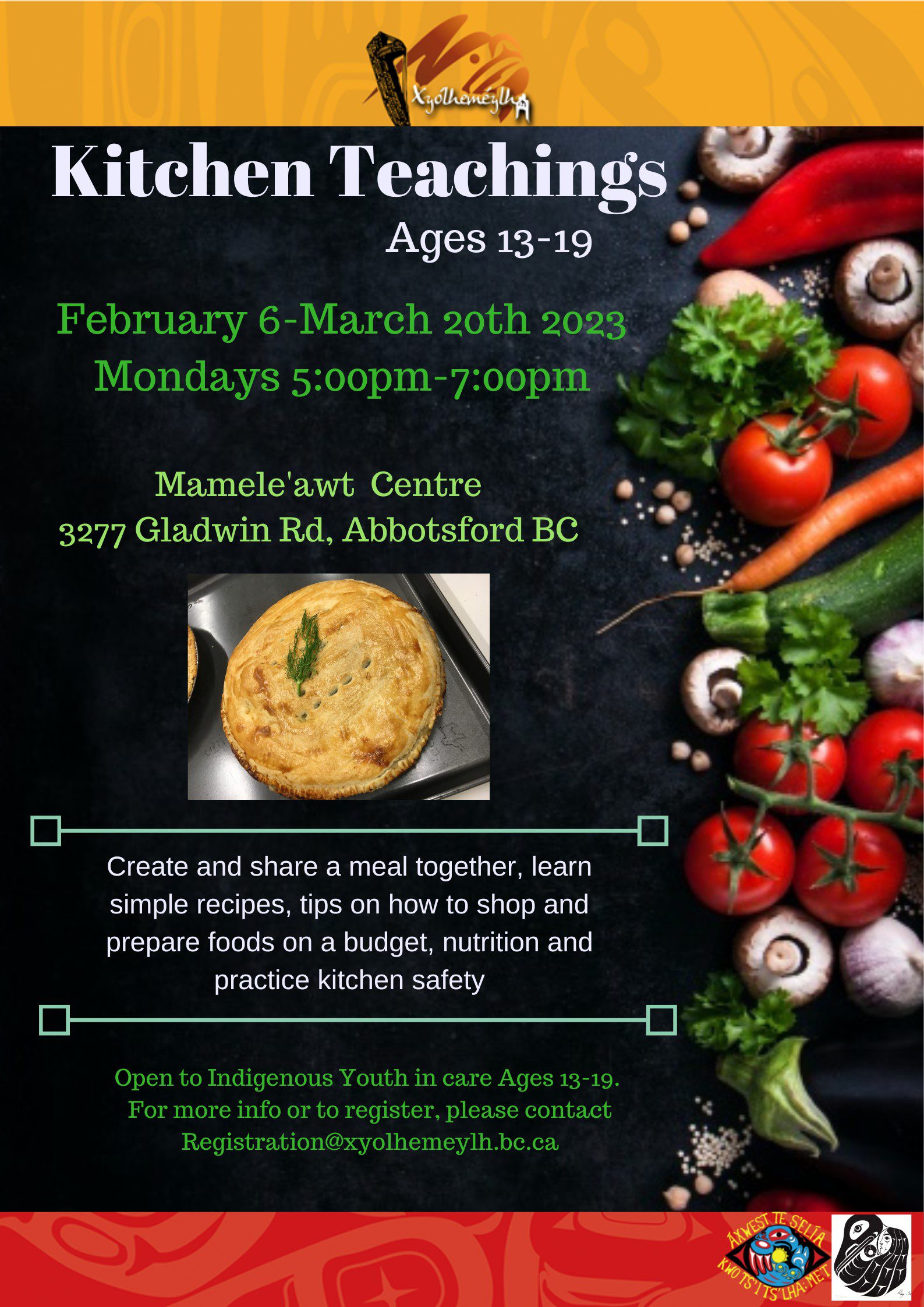
Sxwelméxelh Sq’ep
(Gathering of Cultural Teachings)
